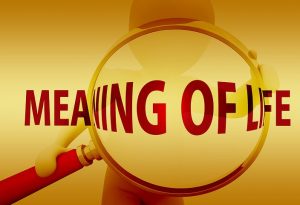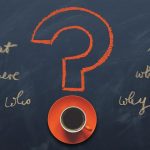 EPISODE SUMMARY:
EPISODE SUMMARY:
In season 5 episode 2 of the Eudo Podcast, we dive deeper into the question of meaning, as we explore various senses of the word and how they all connect to our quest to find our place in the universe.
EPISODE NOTES:
The Meaning Triad [1]
Goetz and Seachris note that the many uses of the word “meaning” cluster around three basic ideas: purpose, significance, and intelligibility or sense-making. So, for example, we say things like:
- What did you mean by that look? ( = what is the purpose of that look?)
- You mean nothing to me. ( = you do not matter to me, I do not value you)
- What do you mean when you say I look like a clown? ( = how do I make sense of your claim that I look like a clown?)
So, we see these three basic ideas, or senses of meaning, at play when we use the word “meaning.” And pointing out these three basic senses will help us understand, I think, a bit more clearly what it means to find meaning in life and the meaning of life.
First, purpose. Intuitively, when we ask the question of life’s meaning, many assume or think we are asking a question about the purpose of life. In our own lives—in the activities we undertake and in the things we make, we can’t but help to explain our actions in terms of purpose. So, we find that there are purposes in life.
This naturally leads us to wonder whether there is a purpose of life too. Think of it this way: as contingent beings, it is natural to think of ourselves as artifacts—of our parents, of the universe, of a designer of it all. We are contingent beings, and arguably, plausibly, contingent beings must have been caused to come into being by something or someone else. So, when we ask about the purpose of life, we are typically seeking an answer to the question, why was I created? Why am I here? For what reason do I exist? What am here I for?
According to theism, the purpose of life is perfect happiness and perfect happiness is found in permanent, close, union with God. We were created by God and for God. On theism, we can accommodate our commonsense intuition that we act in life for reasons, as well as our natural desire to understand why we’ve been created: we’ve been created by God for perfect happiness, which consists in eternal relationship and union with God and others as we work and worship.
According to Goetz and Seachris, the second plank of the meaning triad is significance. The idea that we long for significance can be divided into two sub-longings: The longing for value and the longing to matter.
Philosophers have noted a tight connection between meaning and value. Consider the things we pursue in life: we pursue them because we think or perceive them to be good, or valuable ends. And we find meaning in those valuable ends.
In his book, Robust Ethics, the philosopher Erik J. Wielenberg notes the connection between intrinsic value and meaning. First, some activity or some thing has intrinsic value if it has value “solely in virtue of its intrinsic properties” [2]. By way of contrast, a given activity or thing as extrinsic value if “the value it has [is] in virtue of how it is related to things distinct from itself” [3].
The point: Wielenberg argues that there is a close connection between intrinsically valuable activities and meaningful lives. So, if we engage in intrinsically valuable activities, then our lives are intrinsically meaningful; that is, life is good for me. And if our intrinsically valuable activities outweigh the evils in life, according to Wielienberg, I live an overall good, or intrinsically meaningful life. The problem for Wielenberg, given naturalism (or more technically, a godless non-natural universe) is with fit. This tight connection between objective value and a godless non-natural universe don’t fit together well.
In a godless world, we might ask, why be moral? Suppose I’ve found myself in possession of an invisible ring. When I wear it, I can do anything I want. I can rape, murder, steal. I can live an immoral life. Suppose that living such a life makes me happy. My subjective happiness is what I value most, it is what is intrinsically valuable to me. On Wielenberg’s account of intrinsic value and meaning, I would be leading an intrinsically meaningful life: Life is good for me. Given a godless universe, this immoral yet subjectively happy life is no less rational than a moral life. And it is no less meaningful.
But this doesn’t seem right. I think that our commonsense intuition is that acting morally is, all things considered, the rational thing to do. But, on naturalism or godless non-naturalism, things don’t fit together in the right way: we ought to be moral because it is the rational thing to do. But in a godless world it is equally rational to live immorally if that brings me the most subjective happiness (and thus intrinsic meaning). But then, the universe doesn’t ultimately make sense.Wielenberg allows that there is no ultimate meaning, but still argues that are lives can be significantly meaningful. This iscorrect, but the fact that we could live a meaningful yet immoral life on this story makes this option less attractive, because we ultimately live in an unintelligible (godless universe). We’ll return to this when we consider the third plank of the meaning triad and the question of intelligibility.
On theism, on the other hand, we see the tight connection between morality, intrinsic value, and meaning. Theism grounds objective meaning because it supplies the correct ontology, teleology, and axiology. The idea is that God creates a good world and populates this world with creatures that flourish in light of their natures. There is a way things ought to be built into the foundation of the universe. Moreover, there is objective value in the world because all things are created by God and are good because they participate in God’s goodness in some way or another. We ought to act morally because it is the right and rational thing to do, because we flourish in light of our natures, and these natures are the way they are because we’ve been created by God and for God.
CONCLUDING REMARKS:
In this episode, we discussed two out of the three basic senses of the term “meaning.” In the next episode, we will continue this discussion and discuss the last leg of our three-pronged tool—meaning as sense-making.
RESOURCES MENTIONED:
- Stewart Goetz and Joshua W. Seachris, What is this Thing Called the Meaning of Life?
- Doug Groothuis, “What is the meaning of Life?” in Problems in Value Theory
- Erik J. Wielenberg, Robust Ethics
Thanks to our season five sponsor:
[1] Stewart Goetz and Joshua W. Seachris, What is this Thing Called the Meaning of Life? (New York: Routledge, 2020), 6-11.
[2] Erik J. Wielenberg, Robust Ethics (Oxford: Oxford University Press, 2014), 2.
[3] Ibid.




